Is your goat lethargic, sick, or does she have bottle jaw? All of these are signs of anemia in goats. Learn more about treating anemia in goats and how to get your goats back to total health.
When it comes to livestock it can be tricky to find the cause of what ails your animals without calling the vet out every week. Do you have a lethargic goat? One with a dull coat and no energy? Maybe she’s even come off her feed.
This site contains affiliate links. If you make a purchase using one of these links, I may earn a commission. Please see my disclosure page for more information about cookies collected and our privacy policy.
Chances are you might be dealing with anemia. Anemia can be a silent killer among livestock- without keeping a careful eye on your animals sometimes the condition can get really bad before you know it.
Your Complete Guide to Diagnosing and Treating Anemia in Goats
Technically, goat anemia is the term used to describe a shortage of red blood cells which can deprive the body of necessary oxygen.
It can be a serious condition in any animal, so it is best to be knowledgeable about the causes, signs and treatments so you can be proactive and catch any cases of anemia in your goats before it’s too late.
What causes anemia in goats?
The number one cause of anemia is goats is parasites severe worm infestations. The most common parasite is an internal bloodsucking worm that goes by the name of barberpole worm (Haemonchus contortus).
You don’t want to play around when it comes to the barberpole worm. We have yet to lose any goats to this parasite, but it did take down 3 of our alpacas a few years ago. In addition to the barberpole worm the following things are also possible causes of anemia in goats:
- Other internal parasites such as live flukes or brown stomach worms
- External parasites such as bloodsucking lice, fleas or ticks
- Anaplasmosis- a tick-borne, hemoparasitic disease
- Blood loss from internal bleeding or excessive bleeding from external wounds
- Kids- strain from pregnancy and nursing
- Poor diet without enough protein and essential minerals
How to diagnose anemia in goats
So now that you know what anemia is and what causes it in goats, let’s talk about how to identify and diagnose anemia in goats.
You need to use your senses and be aware of the overall condition of your goats. Here are the 3 main things to look at when diagnosing anemia in goats:
Eyelid Color:
When I suspect anemia in one of our goats the first thing I do is check their color. Pull down the lower eye lid of you goat and check the color of the inner membrane. It should be a nice bright shade of pink.
The more pale the color the more anemic your goat is. If the inner eye lid is white the goat has severe anemia and needs immediate treatment.
This is called FAMACHA scoring. The FAMACHA method was developed as a tool for those raising small ruminants to match the color of the eye mucous membrane to a color chart. This chart has 5 categories that correspond to the different levels of anemia. Category 1 (red or dark pink) represents no anemia and Category 5 (white) represents severely anemic.
I will say that some of our animals- are pinker than others. One in particular stays middle range on the color scale, even when I know she is not carrying a high worm load. So know your goat’s normal. And when in doubt- go ahead a treat.
Checking eye lid color is something I recommend all goat owners do at least weekly. Put it in your care calendar or Goat Management Binder and make sure you check each goat so that you can fix any problems before they become life threatening.
Is Bottle Jaw Present?
What is bottle jaw in goats? It is a condition where the lower jaw of your goat swells. This is an edema (fluid accumulation) in the tissue caused by anemia.
If you see your goat with bottle jaw, your animal is probably already very anemic and closing in on a fatal level. You should start treatment immediately.
The goat in the image below has bottle jaw. You can see the swollen skin hanging down. You can also notice that the goat looks sick. Her eyes are droopy and are missing that sparkle that goats tend to have.
Overall Condition of the Goat:
Most of the other signs of anemia in goats are related to the general condition of your animal. Such as:
- They will be lethargic and just look sad and sick. They may have lost their “smile” and the sparkle in their eye.
- Their coat will be dull and of poor quality
- They may lose weight
- They have loss of appetite and may go off feed
Any time you see a goat standing off by herself or not getting up when you come into the yard you should do some investigating to find out what is wrong.
How to Treat Anemia in goats
De-Worm:
When I have an anemic animal, the first thing I do is worm them. On our farm we only worm when we feel there is a need- some worm on a schedule regardless of need, but I think that builds up unnecessary resistance.
Since the barber pole worm is the most common cause of anemia, and we live in an area that is very prone to barber pole worm outbreaks, we worm at the first sign of anemia.
We use an herbal dewormer as a preventative, but when it comes to a heavy parasite load and anemia in goats we bring out the chemicals.
Ivomec is my top choice. Read more on the Ivermectin Dosage for Goats and how to give this medication.
Most wormers suggest that you to re-treat in about 10 days to catch new eggs that hatch. It’s best to do a fecal examination if possible to see if re-treatment is necessary.
*Note: Knowing your area and its parasite resistance is key to effective worming. In the past year I have seen Ivomec losing its effectiveness in my area and I now use Prohibit as my main dewormer of choice.
If I see signs of external parasites, I will treat for that as well. But usually I start with internal and see if that improves things.
My The Busy Homesteader’s Goat Management Binder will help you as you treat and prevent illnesses in goats. It’s got record sheets and checklists plus a bonus treatment guide for common illnesses such as anemia and a mini course on how to take your own fecal samples and how to do a fecal egg count in the sample to diagnose parasites.
Supplements:
Our goats all have access to free choice minerals, but if a goat is showing signs of anemia I will also add some one-time supplements to help strengthen her and help as she rebuilds the number of red blood cells.
Some supplements include:
- Nutri-Drench– this is a vitamin rich drench that just gives an overall energy boost
- Red Cell– an iron supplement. I give this once a day for a 2-5 days just to help out. It is not a cure and be sure to dose for your goat’s weight so you don’t overdose. The dose is 4-6 ml/ 100 lbs.
- Probios® – a probiotic to keep the rumen running healthy
- Vitamin B-12– an essential vitamin in rebuilding red blood cells. I tend to give this as an injectable Fortified Vitamin B Complex. Read more about this essential vitamin: B Vitamins and Your Goat’s Health
Feed:
Anemic goats are weak and not as interested in feed and forage. Feed your goats a quality alfalfa hay and high protein goat pelleted feed. This will help them rebuild their red blood cells.
You may want to move them to a smaller pasture if possible, so they don’t expend what energy they have on roaming for forage. Make sure to keep their loose mineral feeder filled at all times.
Weaning:
If you have an anemic mother, whose babies are old enough to be weaned, consider separating them so that the mother has a chance to recover and get stronger.
The kids probably aren’t getting real good quality nutrients from a sick mother and might be better off if they are encouraged to get their calories from forage, hay, and feed.
Blood Transfusions:
If you have an animal with a case of severe anemia, sometimes a blood transfusion is the only way to save them. This can be an expensive option- but if your favorite milker is suffering it is one you might consider.
Your local vet is likely not set up for this. When we had a very sick alpaca we needed to transport for a transfusion the University of Tennessee Vet Hospital was the closest option- over 2 hours away.
How to Prevent Anemia in Goats
Prevention is always the best medicine. So how do you prevent your goats from getting anemia in the first place?
Proper Nutrition
Proper nutrition will go a long way in keeping your goats healthy. Make sure you are feeding them the right mix of hay and forage and not giving too many grains.
Check and make sure they are not too fat or too thin and alter their feed rations appropriately.
Here’s my guide on Goat Nutrition to help you feed your goats correctly.
Proper Supplementation
Making sure your goats are not deficient in any mineral or vitamin will also help keep them in top shape and prevent anemia.
In addition to feeding loose minerals you should also make sure your goats are not deficient in the following minerals:
- Copper: Copper is very important to goats and can play a big part in their overall health and hardiness. Here’s more on treating copper deficiency using a copper bolus.
- Selenium: Selenium is an important part of reproductive health, so be sure your goats aren’t deficient especially around breeding season. Here’s more on identifying and treating selenium deficiency.
Cleanliness
Cleanliness will play a big part in your goats’ overall health. If their barns are clean and their feed and water buckets are kept clean then they will be less likely to carry heavy loads of parasites.
This also means preventing overcrowding and making sure your goats have plenty of indoor space to get out of the elements.
Also remember to keep your barns and pastures as dry as you can. Don’t put your barns in areas with poor drainage and make sure your pastures can drain and dry properly so that your goats aren’t in wet conditions very long.
The bottom line? If you are a goat owner, or will be soon, the main thing to stay on top of is their coloring. Check your goats’ eye color weekly so you learn their normal and healthy color and you can spot any problems before they reach a fatal level. Sometimes if you wait until they show outward signs, it might be too late.
Anemia in Goats FAQ
Does Coccidia cause anemia in goats?
Coccidiosis can cause anemia in goats in severe cases. This usually happens when the infestation is so large that there is severe damage to the GI tract causing a loss of blood.
How much Red Cell do I give my goat?
The dose for Red Cell for goats is 6 mL per 100lbs of goat. You should give Red Cell daily for 5 days. Then give once per week until they are no longer anemic.
How do goats become anemic?
There are a lot of reasons goats become anemic. Most commonly it is due to internal or external parasites, blood loss, or stress from pregnancy, kidding, or raising kids.
What does b12 do for goats?
Vitamin B12 is essential for goats in that it helps in the formation of red blood cells. Since anemia is a lack of red blood cells, B12 will help them get over the anemia more quickly.
How often do you give an anemic goat B12?
B12 can be given 1 time per day for as long as the goat needs it. If your goat is severely anemic, you should be giving B12 (or Fortified B Complex) injections for at least 5 days. After that you could use an oral supplement if you don’t want to continue injections.

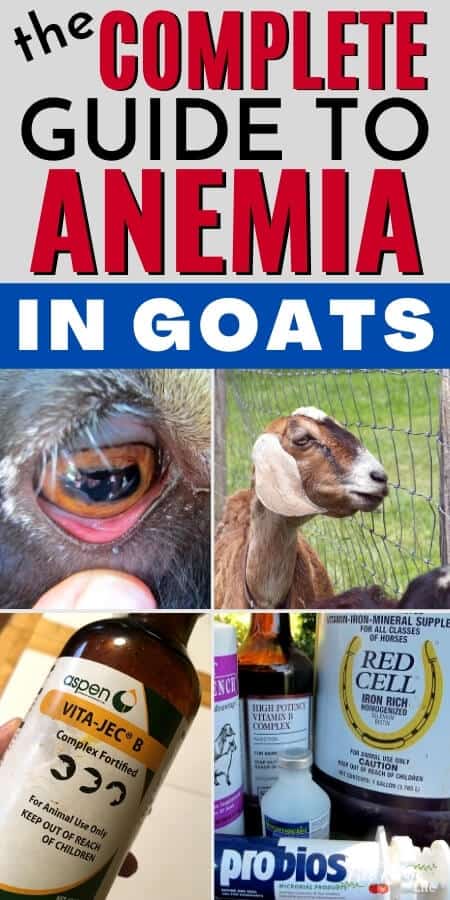
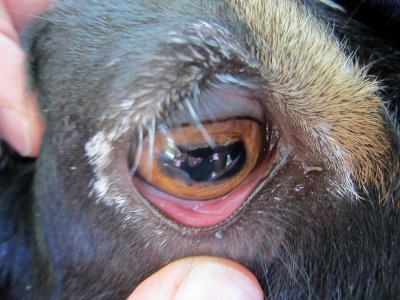
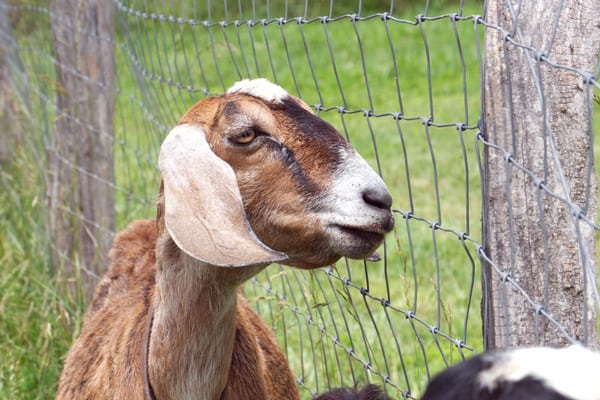
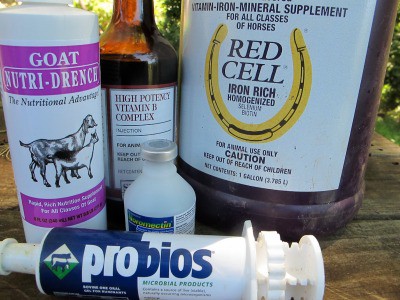
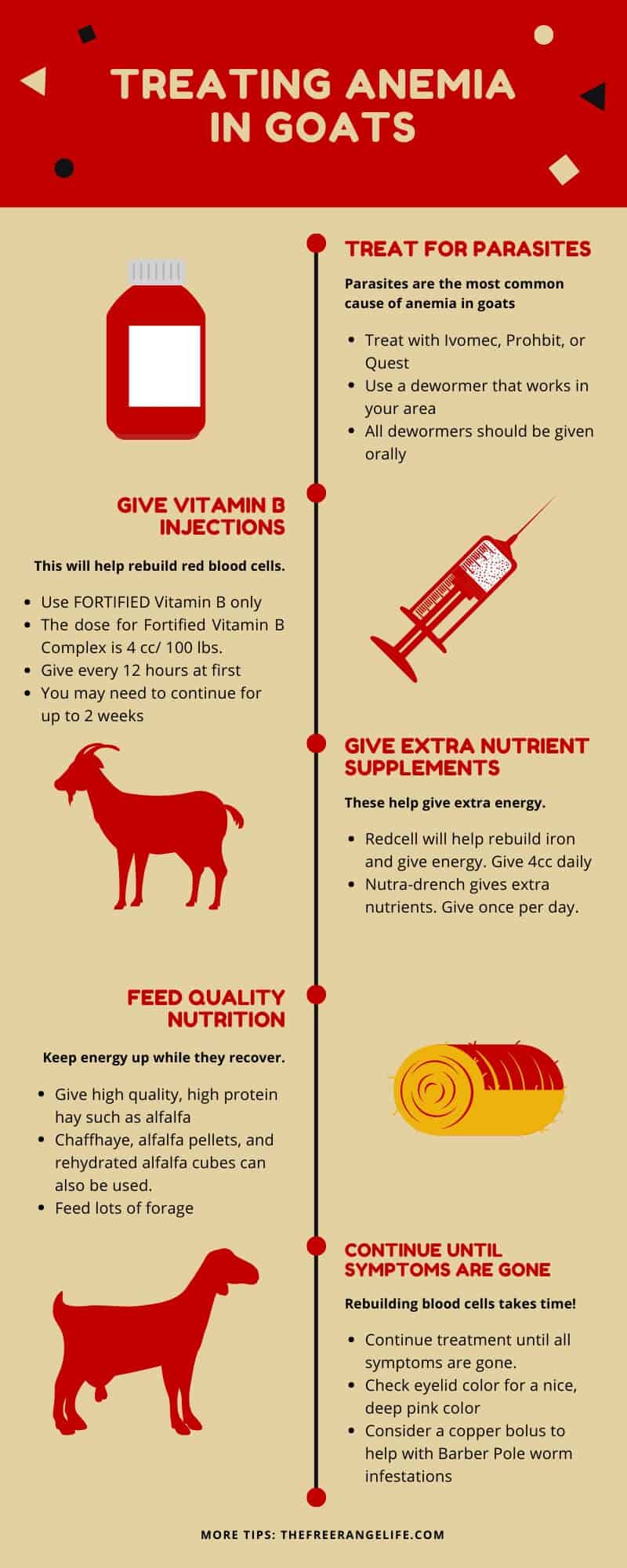



Excellent information. I like your treatment approach. I
HI! This is a great post! A comprehensive but digestible look at Caprine anemia with some great supplement suggestions. This worm/parasite root cause is a big issue for goat owners right now. We live in rainy, hot & humid south FL and found out quickly that using only herbal de-wormers was not an option, as much as we had hoped to go that route. We like the herbal as a preventative and like you had to resort to Ivomec then to Cydectin. Monthly is necessary in the summer here!
Would you consider sharing this as a “guest post” on my website? I intended to post about this but there is no sense re-telling what you’ve said so well! Thanks!
What is the dose for goats on the RedCell?
6cc per 100lbs
Great information. Thanks for sharing at the HomeAcre Hop be sure to come back and share another :)
Such a thorough post. Thank you.
Diet for anemia contributes to the formation of a sufficient number of platelets, which sends oxygen to all the cells of our body and eliminates iron deficiency
Hi, I have a friend who has a goat that has a bottled jaw, unsure of eyelid colouring but has lost weight. She has said that she has recently wormed her goat and is feeling quite frustrated at the fact she hasn’t seen any improvement and is worried. Is there any thing else that could cause the bottleing of the jaw? Thanks in advance.
Check eye color- bottle jaw is a symptom of anemia and they need treatment immediately. What wormer did they use? Ivermectin has been the best wormer of choice for barberpole worms. Coccidia can sometimes cause a secondary infection and anemia and make sure their free choice minerals are always full.
I have a question if someone could please answer it..
I have a small boer dappler, i believe he has bottle jaw. His poor little face is swollen up. I gave him some wormer 3 days strait for that worm. I have gave him iron for 2 days straight, and a antibiotic. But it has been 1 and half of a week and still looks the same. Do you have any advice?
If you look at his inner eyelids are they pale or pink-red?
I just got a goat on monday. He is probably two. He is very skinny maybe 75#. Last night I fed him he was fine. Today I went to feed store came home tried feeding he wouldn’t eat nor will he move or get up. Called the vet and took a fecal sample to vet. Vet said he has alot of worms and is anemic. Gave me medicine (3 day supply) and I bought red cell and gave him roughly 6 cc. Will my goat survive and if so how long befor he gets up? He won’t eat or drink. I gave him water with syringe and some gateraid. It’s frustrating bc if I knew he was sick I would have took him to vet befor he laid down n won’t get back up
It takes awhile to regrow the lost blood cells due to anemia. I would check his eyes daily to look for signs of improvement. Maybe get a good alfalfa hay to help him get stronger too. They make goat electrolytes that might be better than gatorade- or you can make your home mixing a little salt, baking soda and molasses (Google a recipe) What medicine did you get from the vet. Most wormers will need a follow-up dose in about 10 days to make sure you catch any newly hatched worms.
Does he have a companion? Goats can also get stressed when they are moved (called shipping fever) we keep Biomycin on hand for this just in case.
Sir i have some goats and from some days one of my goat is not keeping well first it had some problems in legs it got swollen and after that i got worms in 3 of its legs as the treatment is on it got the worms in its eyes
Can you please help me what type of medicene should i give to get rid of this disease
Thank you for your website. Two of my goats have anemia. One is pregnant still and the other delivered . The one that is pregnant seems to be doing good. Babygirl seems to keep relapsing. I’m doing everything but the B-12. Should I give her another dose of deworm? I did the second dose already its been about a week sense the last dose.
Great info- thanks! In your experience and in using your protocol how long would you say it takes your guys to bounce back? I have a wether who is anemic and has lost some weight. He was so weak a few days ago but has gotten stronger since giving probios, b12, good hay and electrolytes. His gums and eye lids are still so pale! I’m not sure what else to do! I also had a parasite screening done last week and everything looked fine.
I takes awhile to regrow the lost blood cells. Make sure worms are gone and then just make sure they are supplemented with good vitamins and minerals until they pink up again.
Hi Sarah I have a momma Nubian that gave birth to twins 3 weeks ago..
3 days ago we noticed her face was swelled and under her chin…her lower eyelid was white..
We looked it up how to treat and a friend who raises goats told me she has bottle jaw caused barber pole worms and deworm and give her a protein boost also…we gave her wormer day one her body weight dose..next day another dose plus add additional 20 lbs. Day 3 gave her double dose…her eyelid had a very light pink and the swelling went day…this morning she looked fine but this evening we went down to feed…her face has swelled up slight and her loser eyelid is solid white…..we gave another dose of wormer ..
Oh also during these 4 days we gave a protein boost, B-12…I’m so worried…please help with any good suggestions…
What natural wormer do u use? I have been trying to figure this out.
We grow wormwood and feed it to the goats with good results (not pregnant does). We have also used Molly’s Herbals and also had good results.
Hi I am finding all your advise very helpful but I live in the uk and I am finding it so hard to get any vet with good advise as goats are not that popular over here yet.
I am crossing pygmy with angora to get the pygora it has not been done here yet and so far I have had some very good results. But I am having real problems with my pedigree Corrimore buck he is under weight and as anemia he has colasped three times and each time we get him back from the brink, he is still under weight. I have been told it is the fluke worm that is causing all his problems, he also has bottle neck which is one of the symptoms.
I do not know how much he can take. He is such a amazing animal I can not loose him.
What is dosage for Vitamin B12?
We give 4cc per 100 lbs of the Vitamin B Complex
The information you have provided is great! I’m new to goat owning and I’m already so in love! I’ve looked up your links for the two chemical dewormers. On your blog you said you give them orally but the links to Amazon say to inject. I’m speaking directly about the Ivomec & Cydectin. How did you give these two orally?
Yes, most medications are used off label for goats. So both cydectin and Ivomec are injectable but because of the way goats metabolize things you want to give them orally. So you pull out the dose with a needle then remove the needle and administer orally. I need to go back and update the post- we have recently had more issues with Ivomec and resistance (still works for some but not as well as it used to, but every area is different). Prohibit is what I currently use as far as chemical wormer (found here: http://amzn.to/2ulK1n3)
thank you so much for this comprehensive explanation and detailed advice on how to handle anemia. showed up unexpectedly with some kids doing great and others not growing well at all although no signs of parasites ever presented.
I have a doe with bottle jaw- I have treated for over ten days with red blood cell, gave several doses of B12 and have done wormer 4 days straight (vet suggestion) her bottle jaw is not going away, is it something that takes awhile to go down?
It can, it takes awhile to rebuild red blood cells so if she is severely anemic it might take a little while. b12 is one the more important things to give. As is high quality hay such as alfalfa. I have good luck giving Nutridrench daily too.
I have found that a day or so after deworming my goats will show signs of bottle jaw. Is this just a toxin thing from the kill off of worms? They may have very light color membranes and that is why I gave dewormer but at that time no sign of bottle jaw.
HI, I have both vitamin b complex fortified and vitamin b12.
I am confused which one to use in my anemic goats and how much?
Is one better then the other?
Thank you
Connie
Love this post, very helpful. How much Probios should be given?
5-10g per goat. I use the tubes and use the notches for dosing- move 1 notch per goat.
What is your dosage for the Prohibit?
Thanks!
Hi my goats are anemia by checking the eyes. I had a vet check for any eggs and they were clean. I went ahead and wormed by mouth three straight days wit ivermectin and valbazine. Then in ten days I worked with prohibit by mouth. I gave red cell every day for thirty days , I gave vitamin b complex once a week for one month, they are on a good free choice mineral, free choice baked soda, I sprayed once a week for four times for any outside parasites. I gave probious, I got them on a good feed, I give them alfalfa feed. They have clean water and clean feed troughs every day before feeding. I rotate pastures every three months. I’m lost???? What else do I need to do to solve the problem??? I have tried about everything that I have read. Any help will be appreciated!!!!!!!
Have you found any solutions or causes? I’m going through the exact same thing, fecal tests coming back clean and the vets don’t know either. I’m afraid there may be a much greater underlying problem.
Thanks!!!
Much help here. Thanks.
I have a small herd that has free-ranged for years. These large Nubian dairy goats are all showing signs of severe anemia; and I’ve never noticed such a condition before. (All eye lids are either white or nearly white.)
Their steady “daily” diet has been Alfalfa Pellets, Shredded Beet Pulp (with molasses), baled hay (both types: alfalfa and orchard grass), free-choice Baking Soda and “loose” mineral mix (for goats) from Southern States. This has been their steady diet for over 15 yrs.
This year the 4 babies born were weak. (Only one was able to do well enough to nurse and, thus, stay with its own mother.) One of the 4 babies had to be brought into the house, washed in warm water, tubed with its own mother’s milk & nurtured for days until it could be turned back with the herd. These last two are concerning me now.as both are extra weak. They have each had to be tubed with their own mother’s milk. One can stand and walk around though it appears too weak to assert itself long enough to find its mother’s nipples and nurse. The other cannot get up without help.
I suspect severe anemia is the cause of all these problems! None of my goats have had swellings around their face, they have all been “playing” with each other and wondering around the pastures well; and their appetites have been good. Lab tests show “no” coccidiosis.
I have Ivermectin 1%, Vit B complex, Red-Cell and a jar of molasses (Thinking of putting a bit of this molasses in with the next tubing of these last 2 kids.) Will be worming them “orally” according to your suggestions here with the Ivermectin 1% injectable. (Isn’t it 1cc per 30 lbs. then repeat in 10 days?) An email response would be appreciated.
I would say selinium defecency.. for the mother’s with week kids I give them a inch of the paste 30 days before kidding. The only other thought maybe copper deficiency.. maybe do a soil sample to find out your soil defecency s. Hope that helps
What dewormer do you use for nursing does? I’ve heard that Ivermectin is not safe while they are nursing kids. We drink the milk from our does as well and it’s easy to find the withdrawal time for when it comes to drinking the milk but I haven’t found very much information on alternatives for when the kids are still nursing.
If I need to use a chemical dewormer, I’ve always used Ivermectin when they are in milk
Excuse my ignorance, but do you give your goats the nutri-drench, red cell, Probios, and B12 all at the same time? Or do you give them one of the items a day?
Thank you for being so informative on how to diagnose and treat anemia in goats. It’s very important to keep in mind goats can be anemia from Coccidia. Coccidia is a protozoa not a worm, and they can be seen under a microscope. Protozoa can take over a goats body extremely quickly if it’s not treated. Symptoms: diarrhea, weight loss, stunted growth, dehydration, and fever. Get a fecal exam and get a one time dose of Toltrazuril. Dewormers do not kill Protozoa.
Thank you for all the information. We have a meat goat that’s about 40lbs. She started to look very sick, became weak and her inner eyelids are white. She can’t stand but does keep her head up. We get her up several times a day and support her then lay her back down. She has been wormed, getting B12, Red Cell and Bounce Back. This has gone on for 6 days and seems to not be worse (not better either), but now has the swollen jaw. She still eats alfalfa, pellets and drinks. I’m wondering if we should put her down or keep trying. She doesn’t seem stressed but I wonder how much longer she can go on like this. Thank you for any advice.
I have a 4 month old goat that we are trying to save but I cant find anywhere the dosing of Red Cell. She Probably weights 25 lbs. How many cc’s a day?
I believe it is 1cc per 25 lb bodyweight.
How often should I be giving the vitamin B-12,probios,nutri Drench
Should I used antibiotics to treat anemic goat?
Not unless they have an underlying bacterial infection along with the anemia.
How much of the probios do you give to one adult goat? Is there a weight ratio?
How long does it take to see a change in eye color I’ve been giving my anemic kid she is 2o lbs 1ml maxi B and 1 ml of red cell for 7 days and have tested her for worms and coccidia and she has no diarrhea and I’m given her probios past for 4 days she has got a good appetite now but her eye lids are about a 2 on the final scale
Hi! Thank you for this information! I have a girl Ophelia and five others from the same dairy farm. She is the youngest about 4 months now (my problem child).
She has been lethargic and have been super eating herself from the rest for about four days now.
I dewormed all of them three days ago and nutri drenched her three times a day two pumps each time since. Her appetite has gotten a little better. I also administered the corrid (b-12) today and will continue for five days as per informed. Can I do the corrid with the red cell on the same days and should I re deworm her now or wait till the 10 days has passed?